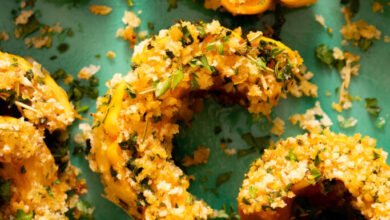

For a long time, I resisted spiral cutting my hot dogs—it felt a little childish and twee. I couldn’t help but picture the cookouts of my youth, where my practical mother, resistant to purchasing two types of bun, would hasselback a frank and coil it onto a hamburger bun like a grub.
But spiral cutting has benefits beyond aesthetic novelty. First, the method—which involves slicing the hot dog all around into a coil—lengthens the dog, meaning it can run edge-to-edge in the bun, which saves you from naked bites of bread. Second, it creates grippy little pockets where condiments can settle, suffusing flavor in each bite. Third—and most importantly—it increases the dog’s surface area, allowing for additional browning and caramelization. For this reason, both Joshua Bousel and Daniel Gritzer recommend either slashing or spiral cutting skinless franks in their hot dog grilling guide. (Though Daniel slightly favors slashing, which he says is faster and less likely to lead to overcooking.)
But why stop at a skinless frank? If spiral cutting works so well for hot dogs, why not other types of sausage? I decided to try spiral cutting five types of sausages: a skinless hot dog, a skinless chicken sausage, an andouille sausage, an Italian sausage, and a bratwurst. The hot dog and chicken sausage were precooked, while the other three were raw.
A small, common-sense voice in my head said: If you cut into a raw sausage, it will fall apart. It will weep fat onto the coals and enrobe your dog in a blanket of soot.
But a louder goblin voice said: What if you just…see?
How to Spiral Cut a Sausage
Spiral cutting a sausage is dead-simple, but can be hard to visualize. A video guide helps, but I’ll do my best to walk you through it here. First, skewer the sausage lengthwise through the center. Then, position your knife at an angle near one of the ends, and cut down until you hit the skewer. Slowly rotate the sausage away from you as you cut, keeping your knife at the same angle. Carefully remove the skewer, and your reward will be a sausage that looks like a telephone cord.
The Spiral-Cutting Tests
Liz Cook
For ease of comparison, I grilled each sausage three ways: fully intact, scored with shallow slashes on opposite sides, and spiraled. I set up my grill for two-zone heating, keeping the “hot” side under 350°F, and I cooked the sausages to temp: 140°F (60°C) for the pre-cooked sausages, 150°F (65.5°C) for the raw dogs (consistent with Kenji’s guide).
Finally, I followed the advice of barbecue expert Meathead Goldwyn and cooked the sausages parallel to the grates (essentially, holstered between them) rather than perpendicular. In theory, positioning the sausages this way allows you to just nudge them over to the next gap like those gas station hot dog roller grills, and also promotes even browning. But I made the choice mostly out of aesthetic disregard. I was already flouting convention with spiral cuts; I figured I might as well give the sausages pinstripes, too.
Will It Spiral?
Skinless Hot Dog
As expected, the skinless hot dog fared well under all three treatments. The intact dog was the juiciest—and also the least texturally interesting. The slashed dog nicely balanced juiciness and a little extra caramelization, but I preferred the spiral-cut dog. The additional crisped edges gave the skinless dog a snap that evoked a natural casing hot dog (my preference, but harder to source in my pocket of the Midwest). The spiral-cut version also came up to temperature more quickly than the intact and slashed dogs—though the time savings are really only a minute or two.
Should you spiral cut it? Yes.
Chicken Sausage
The chicken sausage behaved almost identically to the skinless frank: The precooked sausage held together well through both slashing and spiraling, without drying out. Although the intact version was marginally more moist, the difference was slight enough to make the extra browning a worthy trade-off. Plus, the spiral-cut version came up to temp a little more quickly than both the intact and slashed sausages, making it a win for taste, texture, and convenience.
Should you spiral cut it? Yes.
Andouille Sausage
When I turned to the raw sausages, things went downhill quickly. Fat wept from the slashed and spiraled andouille sausages, causing flare-ups on the grill. Worse, my attempts to save the spiral-cut sausage from soot weakened its structural integrity—every time I tonged it over to the cool side of the grill, the coil became a little looser and more fragile. Although the spiral held together in the end, I came close enough to catastrophe that I don’t recommend it. Plus, both the slashed and spiral-cut versions lost much of their juiciness and bite.
Should you spiral cut it? No. Keep your andouille links intact.
Italian Sausage
The Italian sausage held up even worse to the slashing and spiral-cut treatments. Although both pierced sausages cooked much faster than the intact link, they tasted as dry as a cornflake.
Should you spiral cut it? No. I don’t even recommend poking at it.
Bratwurst
The results for the bratwurst were less conclusive. The spiral-cut brat was once again noticeably less juicy than the intact one, but not so dry that it was a dealbreaker. Nestled on a bun with some kraut and mustard gripped in its folds? I would eat it without complaint. The added length also eliminated any dry bites of brat-less bun. But to my surprise, I had a slight preference for the slashed brat—it was almost as moist as the intact link, but had a slightly looser, less dense texture. Plus, it cooked a little faster than the intact brat (though not as fast as the spiral-cut one), making it a sensible middle-ground option.
Should you spiral cut it? In most cases, no. But you have my blessing to slash it (as long as you’re cooking over low heat).
The Verdict
So, will it spiral? With some careful skewer and knife work, absolutely. But the real question is, should it spiral?
For precooked sausages that have homogenous texture throughout, yes. The extra surface area aids browning and gives skinless dogs a snappier texture. But for most raw sausages, I don’t recommend cutting into them at all—unless you’re especially short on time or cooking for a crowd that likes to play with their food.
Source link



